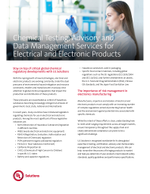
Chemical management solutions for Electrical and Electronic products
Electrical/Electronic product manufacturers and retailers must comply with chemical regulations when exporting products. Learn about the Restriction of Hazardous Substances (RoHS) requirements.

April 15, 2022
Following UL’s webinar “RoHS Requirements All Over the Globe,” we interviewed Ylenia Merli, global market access expert, and Silvia Lai, global technical and regulatory manager at UL, to share insights about RoHS legislation as applicable in various countries.
Read the interview below to learn more.
Question: How does the RoHS Directive define homogeneous material?
Lai: The RoHS Directive defines homogeneous material as one material of uniform composition throughout or a material consisting of a combination of materials that cannot be disjointed or separated into different materials by mechanical actions such as unscrewing, cutting, crushing, grinding or abrasive processes. However, this definition doesn’t always apply if we need to disjoint samples to test them. For this reason, one of the standards we use for testing is IEC 62321-2, Determination of Certain Substances in Electrotechnical Products - Part 2: Disassembly, Disjointment and Mechanical Sample Preparation. It provides more information on how to treat samples, providing, for example, different options like partial or complete disjointment.
Question: Is the UKCA mark necessary on all the electrical and electronic equipment (EEE) placed on the U.K. market?
Lai: The UKCA mark must be present on EEE entering the market in Great Britain, while for Northern Ireland, the CE mark is requested to declare conformity with all relevant legislation.
However, in August 2021, authorities announced an extension allowing the CE mark to be accepted in the U.K. until Jan. 1, 2023. Companies must be ready to use the UKCA mark from Jan. 1, 2023, at the latest, although they should use it as soon as possible.
Until Dec. 31, 2023, manufacturers can affix the UKCA mark by means of a label, or similar, to the product, packaging or documents as required. From Jan. 1, 2024, the UKCA mark should be directly affixed to the product.
Question: For the Saudi Arabia market, who is responsible for obtaining the requested certification? Is it the importer/local manufacturer, or is it the manufacturer based, for example, in Europe, looking to export to Saudi Arabia but not placing their product on the market since the importer/local distributor does that?
Merli: Uploading the final certificate on SABER (the online platform that connects importers, certification bodies and Saudi customs and trade authorities) will be the responsibility of the local importer/supplier, along with the product’s entry into the Saudi Arabia market, whether they are the final distributor or not.
Question: Suppose a company has a RoHS test report to confirm compliance with the European RoHS Directive (EU) 2015/863 amending Annex II of Directive 2011/65/EU. Will it grant them access to the Saudi Arabia market?
Merli: If a third-party accredited service provider like UL issues the report, and the report complies with SASO RoHS technical requirements, it can be accepted.
Question: Does the SABER Certificate of Conformity scheme’s one-year validity mean that electrical and electronics companies must retest every year?
Merli: Not necessarily. If the product doesn’t change, it doesn’t need to be retested. The customer can use the same test report(s) for the annual recertification. They will only need to submit a no change declaration.

Chemical management solutions for Electrical and Electronic products
Thanks for your interest in our products and services. Let's collect some information so we can connect you with the right person.